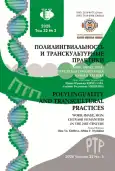The Problem of Lexicography of Chuvash Toponyms in the Aspect of Linguistic and Foreign Studies
- Autores: Lukina I.P.1
-
Afiliações:
- Chuvash State Institute of Humanities Sciences
- Edição: Volume 22, Nº 3 (2025): WORD, IMAGE, SIGN: CHUVASH HUMANITIES IN THE 21ST CENTURY
- Páginas: 512-522
- Seção: Language in System
- URL: https://bakhtiniada.ru/2618-897X/article/view/350683
- DOI: https://doi.org/10.22363/2618-897X-2025-22-3-512-522
- EDN: https://elibrary.ru/AIYRLD
- ID: 350683
Citar
Texto integral
Resumo
The paper discusses the scientific, theoretical and practical problems of linguistic and cultural description of Chuvash toponyms. The purpose of the study is to determine the basic principles of lexicographic fixation of Chuvash geographical names with pronounced national and cultural semantics. For the first time, a comprehensive study of the linguistic and cultural potential of regional toponyms has been undertaken, and thematic groups of geographical names have been identified. The article highlights the need for a multidimensional analysis of toponymic systems. The dictionary entries Shupashkar “Cheboksary” and Atə̂l “Volga” are presented as an example. The associative experiment is considered as one of the ways to obtain relevant national and cultural information. The main research methods are the methods of structural and word-formation, linguistic and linguocultural analysis. The author comes to the conclusion that the dictionary entry in the future linguistic dictionary should have the following structure: “Headline word”, sections “Encyclopedic reference”, “In culture”, “In language and speech”. The main criteria for selecting geographical names for the dictionary should be their current representation in the public consciousness and regional value, which are manifested at the linguistic level by the presence of well-known reproducible phrases, the use of a toponym to name objects of other onomastic classes, the use of permanent epithets, the possibility of metaphorical correlation with another well-known place name, the existence of peripheral names, intersection with the biography of famous figures national history and culture.
Palavras-chave
Sobre autores
Irina Lukina
Chuvash State Institute of Humanities Sciences
Autor responsável pela correspondência
Email: irinnasemenova@yandex.ru
ORCID ID: 0000-0002-8370-880X
Código SPIN: 8516-4662
Candidate of Philological Sciences, Researcher in the Philological Department
29/1 Moskovsky Prospekt, Cheboksary, 428015, Russian FederationBibliografia
- Vereshchagin, E.M., and V.G. Kostomarov. 1980. Linguistics theory of the word. Moscow: Russian language publ. EDN: PGWRSR Print. (In Russ.)
- Podolskaya, N.V. 1982. “Linguistic and regional dictionary of toponyms.” In Dictionaries and linguistic and regional studies. Moscow: Russian language publ., pр. 73–82. Print. (In Russ.)
- Rubleva, O.L. 2007. “On the linguistic and cultural potential of toponyms and the corresponding dictionary.” In Russia — East — West. Problems of intercultural communication: Materials of the scientific conference. URL: https://www.toponimika.ru/index.php?id=80. (date accessed: 04.02.2025).
- Molchanovsky, V.V. 1984. Linguistic and foreign studies potential of the toponymic vocabulary of the Russian language and its educational and lexicographic interpretation: PhD thesis. Moscow. EDN: NPDHKB Print. (In Russ.)
- Rostova, E.G. 2017. “Precedent toponyms in the multimedia linguistic dictionary “Russia.” In Onomastics of the Volga region: Proceedings of the XVI International Scientific Conference. Ulyanovsk, pp. 172–178. EDN: RRWEND Print. (In Russ.)
Arquivos suplementares









